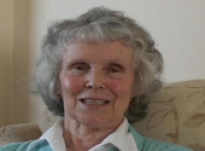Susie - Interview 07

More about me...
Susie felt she was 'walking on air' when she was told her heart was normal, even though she had not really been worried that anything would be wrong.
Susie felt she was 'walking on air' when she was told her heart was normal, even though she had not really been worried that anything would be wrong.
Yes, I did expect them to be okay, you know, because I sort of - all right, fair enough, we all get tired at our age, but I didn’t have any chest pains or breathing problems or anything like that. So I think everything was, you know, okay, so.
Susie says she is not a hypochondriac, but she tries to keep active, she doesn't smoke, and she eats a healthy, vegetarian diet.
Susie says she is not a hypochondriac, but she tries to keep active, she doesn't smoke, and she eats a healthy, vegetarian diet.
No, I don’t. I just make sure that, you know, things are in working order really, you know, to make sure that everything’s okay, and I just sort of carry on and look forward to every day doing different things and that. I like gardening. I walk down the town to do the shopping and I - well, I looked after my grandchildren for fourteen years, you know, and it’s only three years ago I packed up looking after them. And I think that’s really helped keep me active. And, you know, I do worry about keeping active. You know, I don’t want to end up, you know, not being able to do anything for myself. That’s one thing I don’t want. So, hopefully, you know, see how things go.
The letter inviting her for screening came 'out of the blue', but Susie was on the phone straight away to make an appointment.
The letter inviting her for screening came 'out of the blue', but Susie was on the phone straight away to make an appointment.
When I first got the letter about the heart valve survey, I was very pleased to think that people were taking an interest in us, and I got on the phone straight away. I made the appointment, and within a week I’d gone for the test and luckily enough I passed with flying colours. They were very pleased, you know, with the outcome, and I also was, and I know by doing this it helps other people and they can think of other ways, you know, to help heart problems.
Susie thinks her husband might not have needed a pacemaker if there had been more research in the past.
Susie thinks her husband might not have needed a pacemaker if there had been more research in the past.
Well, I think it worked both ways. I was thinking of my benefit, of course, and I was thinking of helping other people. And my husband’s just had a pacemaker put in, you know, and perhaps if they’d have had this years ago he wouldn’t be having it today. So really and truthfully speaking I think it’s worked out in many ways, it has.
Medical research is vital. Susie is in favour but you need to know anything you are given is not going to harm you. She supports careful use of animal testing to check treatments are safe.
Medical research is vital. Susie is in favour but you need to know anything you are given is not going to harm you. She supports careful use of animal testing to check treatments are safe.
No [laughs]. No, I can only say what’s in my heart, but I wouldn’t go out and demonstrate for it, definitely not, you know - not at my age, anyway [laughs]. We’ll leave it to the youngsters.
Susie would still have taken part if the first appointment was in hospital, but others might have been put off.
Susie would still have taken part if the first appointment was in hospital, but others might have been put off.
It was held at our health centre a couple of yards down the road so, you know, there’s no problem getting there. If it had been up to the [hospital] I’d have still gone. I wouldn’t have seen any problem there.
Susie finds it embarrassing having to take her top off, but the person doing the scan was so friendly and reassuring she felt completely at ease. She understands why it's necessary to get a clear picture.
Susie finds it embarrassing having to take her top off, but the person doing the scan was so friendly and reassuring she felt completely at ease. She understands why it's necessary to get a clear picture.
No, they just screen you, I had to lay on my side – it might have been, I forget about that, really. I had to lay on my side and she did it, she sort of come in from the back, and sort of reached over from the back and sort of done it there.
If anyone else is invited to take part, Susie's advice is to 'go for it'. It may help you as well as others, and the staff are doing 'a brilliant job'.
If anyone else is invited to take part, Susie's advice is to 'go for it'. It may help you as well as others, and the staff are doing 'a brilliant job'.
I don’t think there’s anything better they could do. I just think they’ve done a brilliant job, you know, by even starting this, this experiment, you know. And I think there’s nothing more, you know, that they can do that’s any better and I thank them all for what they’re doing.

